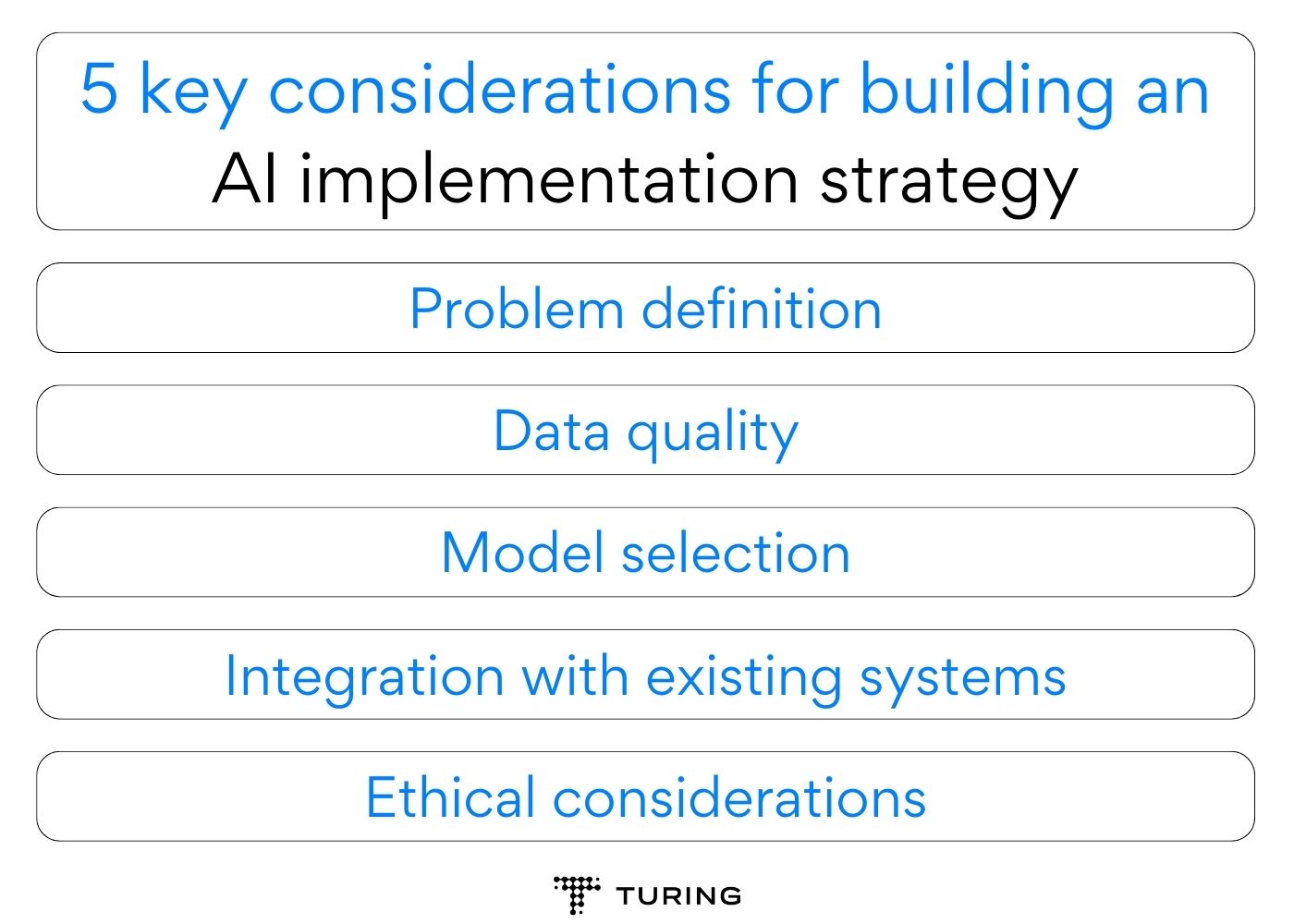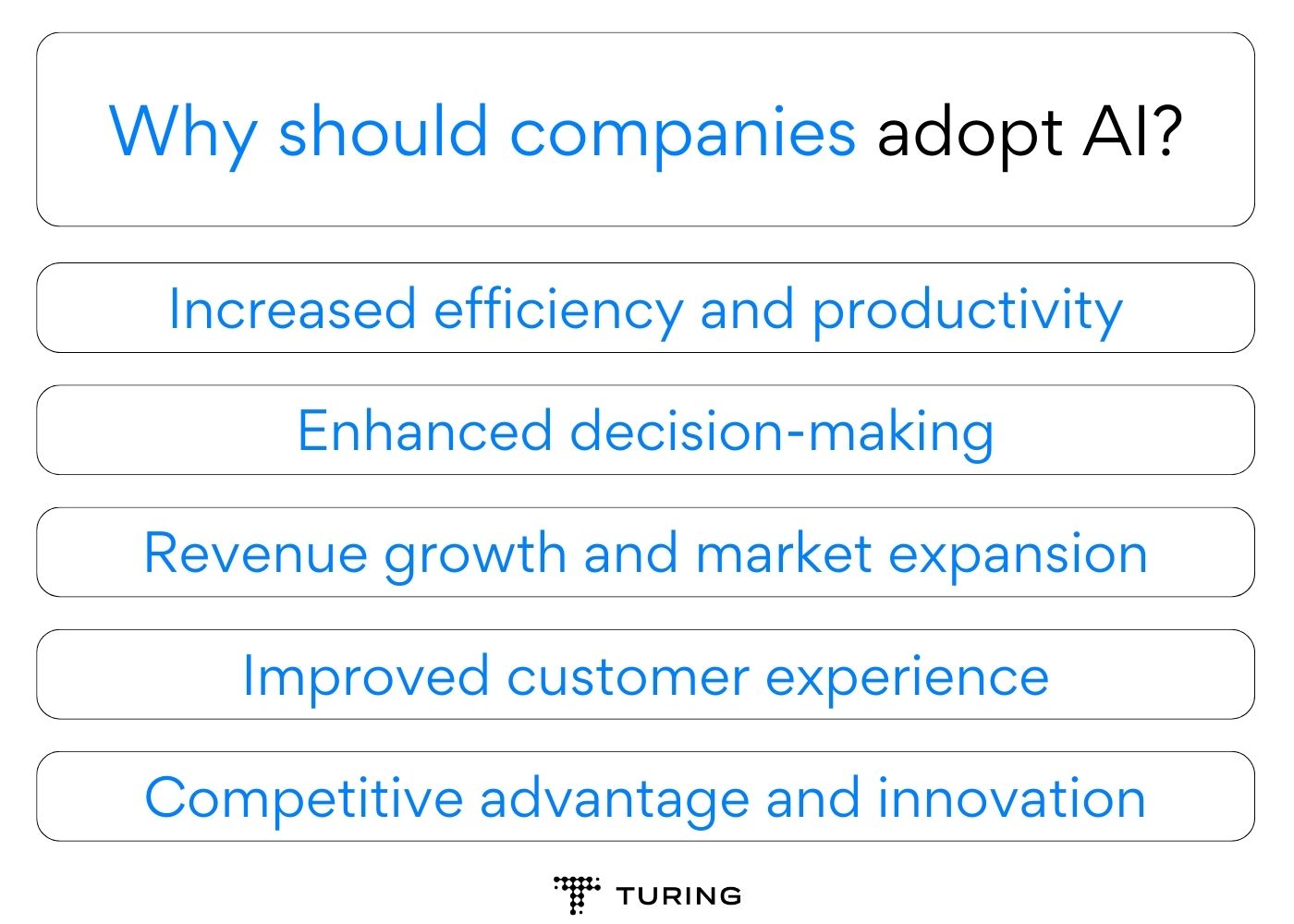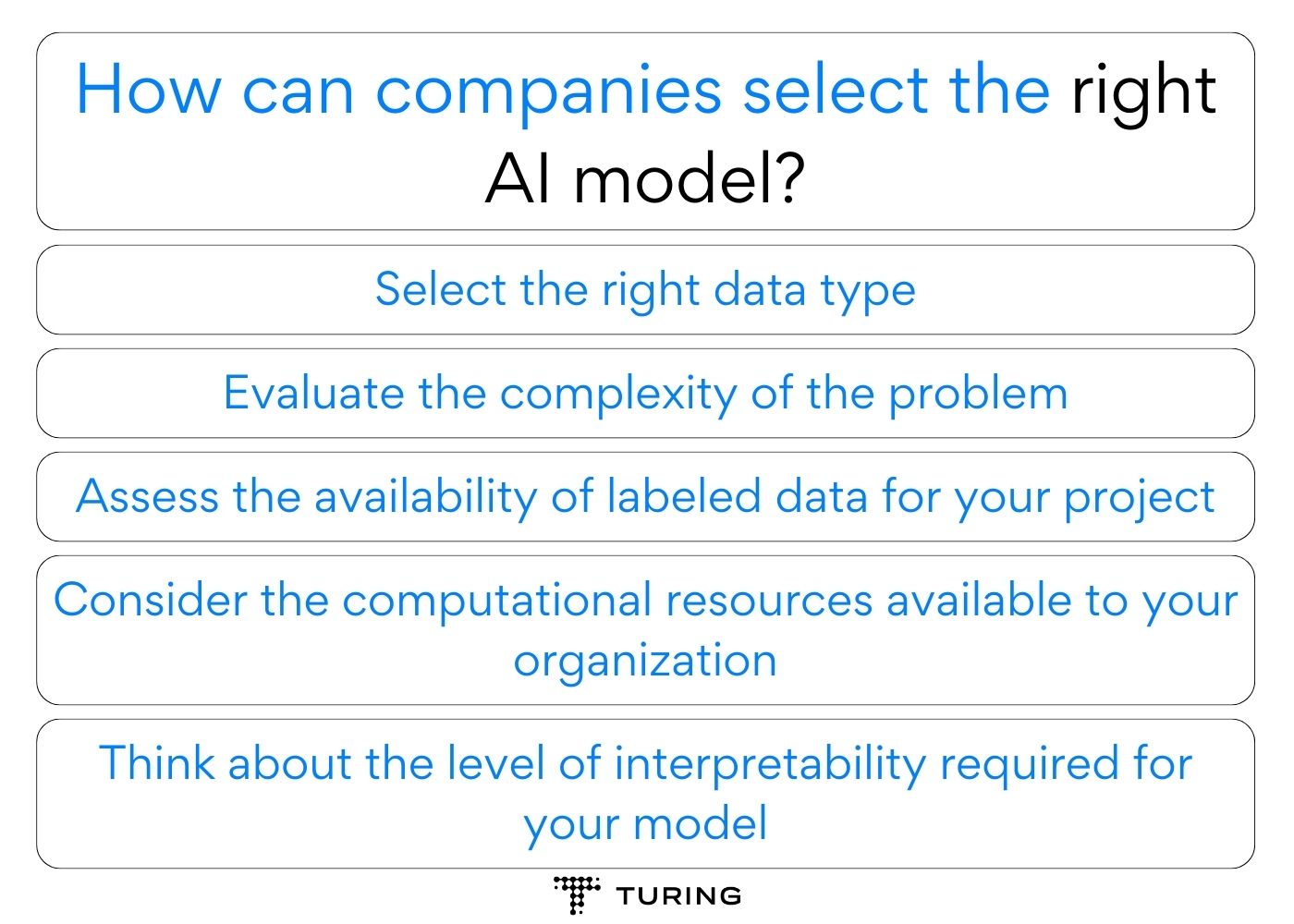5 Key Considerations for Building an AI Implementation Strategy
Artificial intelligence (AI) has been widely adopted across industries to improve efficiency, accuracy, and decision-making capabilities. As the AI market continues to evolve, organizations are becoming more skilled in implementing AI strategies in businesses and day-to-day operations. This has led to an increase in full-scale deployment of various AI technologies, with high-performing organizations reporting remarkable outcomes. These outcomes go beyond cost reduction and include significant revenue generation, new market entries, and product innovation. However, implementing AI is not an easy task, and organizations must have a well-defined strategy to ensure success. We’ll be taking a look at how companies can create an AI implementation strategy, what are the key considerations, why adopting AI is essential, and much more in this article.
5 key considerations for building an AI implementation strategy

5 key considerations for building an AI implementation strategy
Let’s discuss the five key considerations for building an AI implementation strategy.
-
Problem definition
Defining the problem that the AI system will solve is crucial. It is essential to identify the business objective and the specific task that the AI system will perform. Organizations must also decide on the metrics used to evaluate the performance of the AI system before jumping into the actual implementation of AI. For instance, if an organization is building an AI system to classify images of animals, it must define the types of animals it wants to classify, the accuracy rate it wants to achieve, and the evaluation metrics it will use, such as precision, recall, and F1 score. Identifying or establishing baselines and benchmarks is also key to evaluating the effectiveness of AI solutions. -
Data quality
The foundation of any AI system is only as good as the data it is trained on. The data is just as important as the AI technology itself because AI builds upon the data. If data is not correct, precise, or relevant, then the AI will make decisions that may not be accurate. Data must be accurate, relevant, and consistent to produce reliable results.
Before diving headfirst into creating an AI model, organizations must assess their data quality and take steps to improve it if necessary. Data cleaning and preprocessing techniques can be applied to eliminate errors, inconsistencies, and duplicate records. Additionally, organizations must ensure that their data is representative of the real-world scenario they are trying to model. For instance, if an organization is implementing AI in business to predict customer churn, it must have data that represents different types of customers and their behavior. In some cases, there is not enough data to train an AI model, forcing businesses to generate synthetic data sources. -
Model selection
Choosing the right model that best fits the project requirement is one of the most crucial factors that an organization, no matter what size, must consider when creating an AI implementation strategy. Different AI models have different strengths and weaknesses, and organizations must choose the one that best fits their requirements. There are several factors to consider when selecting an AI model, such as the type of data, the complexity of the problem, the availability of labeled data, and the computational resources required. For instance, if an organization has a large dataset and wants to classify text, it can consider using a large language model to create vector representations of the text and feed them to smaller classifier models like random forests, support vector machines, or small neural networks. -
Integration with existing systems
Another, often neglected factor in building an effective AI implementation strategy is integrating an AI system with existing systems. This is a complex process that requires careful planning, no doubt. The AI system needs to be consistently integrated into the broader system, meaning the predictions should be used in the right place with confidence. Additionally, organizations must consider the impact of the AI system on the workflows and processes already in place—it must be integrated in a way that minimizes disruption and enhances productivity.
For instance, if an organization is implementing an AI system to automate customer service, it must ensure that the system integrates with the existing customer service platform and that the customer service representatives are trained to use the system. This will improve productivity and significantly help manage the overall cost of implementing artificial intelligence. Additionally, it will help minimize external upkeep and expenses that could otherwise be used for the improvement of existing systems. -
Ethical considerations
It’s finally time to discuss the elephant in the room: the concept of handing over crucial factors to super-intelligent machines can make people uneasy. Organizations must consider the ethical implications of implementing AI in business and ensure that the system is fair, transparent, and unbiased. Additionally, organizations must consider the potential impact of the AI system on society and the environment. For instance, if an organization is building an AI system to make hiring decisions, it must ensure that the system is not biased against certain groups of people and that the decisions are transparent.
Why should companies adopt AI?

Why should companies adopt AI?
The adoption of AI is not a mere technological upgrade but rather a strategic upgrade that can help companies move forward at a much better pace. AI delivers tangible benefits, including improved efficiency, data-driven decision-making, revenue growth, etc. Let’s explore the benefits of AI
-
Increased efficiency and productivity
AI technologies play a pivotal role in enhancing efficiency and productivity across industries. By automating repetitive and time-consuming tasks, AI allows employees to focus on more strategic and creative endeavors. For instance, in customer service, AI-driven chatbots and virtual assistants can handle inquiries round-the-clock, providing instant responses and freeing up human agents to tackle more complex issues. This not only reduces operational costs but also ensures a seamless and responsive customer experience, ultimately improving overall efficiency. -
Enhanced decision-making
The power of AI lies in its ability to process vast amounts of data quickly and accurately. AI algorithms analyze this data to provide actionable insights, enabling organizations to make informed, data-driven decisions. Predictive analytics, for instance, can forecast market trends and customer behavior, giving businesses the edge in adapting to changing market dynamics. With AI support, decision-makers can optimize resource allocation, refine strategies, and navigate uncertain waters with confidence, resulting in better decision-making across the board. -
Revenue growth and market expansion
AI is a potent driver of revenue growth and market expansion. Personalization powered by AI algorithms tailors product recommendations and marketing campaigns to individual preferences. This results in increased sales and higher customer engagement. Moreover, AI’s capacity for market segmentation and customer behavior analysis enables organizations to identify unexplored market opportunities and niche segments. Armed with these insights, businesses can successfully enter new markets and expand their offerings, further driving revenue and market share. -
Improved customer experience
AI revolutionizes the customer experience by delivering tailored solutions and prompt support. Personalization is key, as AI analyzes customer data to recommend products and services that align with individual preferences. Virtual customer service agents, powered by AI, offer round-the-clock assistance, swiftly addressing customer inquiries and resolving issues. These enhancements not only enhance customer satisfaction but also foster customer loyalty, as clients appreciate the personalized and efficient services AI brings to the table. -
Competitive advantage and innovation
Early adopters of AI gain a substantial competitive advantage. By leveraging AI for operational optimization, market trend anticipation, and rapid response to customer needs, businesses can outpace competitors. AI’s capacity to identify new product ideas, streamline research and development processes, and enhance product quality through predictive maintenance fosters innovation. This continuous cycle of improvement not only keeps organizations ahead of the curve but also ensures they remain adaptable and innovative in the ever-evolving business landscape.
AI implementation strategy: How can companies select the right AI model?

How can companies select the right AI model?
Selecting the right AI model is a crucial part of your AI implementation strategy. Here are the factors that you should consider while selecting the right AI model for your company:
- Data type
- Different AI models excel at handling specific types of data, such as images, text, or time-series information.
- Identify the nature of your data to determine which model is most suitable for your project.
- Problem complexity
- Evaluate the complexity of the problem you’re trying to solve. Some tasks may be well-suited to pre-trained models, while others require custom-built solutions.
- Tailor your choice to match the intricacy of your specific problem.
- Labeled data availability
- Deep learning models often require a substantial amount of labeled data for effective training.
- Assess the availability of labeled data for your project and consider techniques like transfer learning if data is limited.
- Computational resources
- Consider the computational resources available to your organization. Large models like GPT-3 demand significant computing power, which may not be feasible for all companies.
- Ensure that your infrastructure can support the computational requirements of the chosen model.
- Interpretability needs
- Think about the level of interpretability required for your model, especially in domains like healthcare or finance where transparency is crucial for regulatory compliance.
- Choose models that align with your interpretability needs and provide the necessary level of transparency.
Selecting the right AI model involves assessing your data type, problem complexity, data availability, computational resources, and the need for model interpretability. By carefully considering these factors, companies can make well-informed decisions that set their AI projects on a path to success.
Also, read ChatGPT vs Software Developers: Is Generative AI the End of the Road for Developers?
What should be the AI implementation plan?
To successfully implement AI in your business, begin by defining clear objectives aligned with your strategic goals. Identify the specific challenges AI can address, such as enhancing customer experiences or optimizing supply chain management.
Next, assess your data quality and availability, as AI relies on robust data. Ensure your data is accurate, relevant, and comprehensive. If necessary, invest in data cleaning and preprocessing to improve its quality.
Select the appropriate AI models that align with your objectives and data type. Train these models using your prepared data, and integrate them seamlessly into your existing systems and workflows.
Prioritize ethical considerations to ensure fairness, transparency, and unbiased AI systems. Thoroughly test and validate your AI models, and provide training for your staff to effectively use AI tools.
Plan for scalability and ongoing monitoring while staying compliant with data privacy regulations. Continuously measure ROI and the impact of AI on your business objectives, making necessary adjustments along the way.
Consider partnering with AI experts or service providers to streamline the implementation process. With a well-structured plan, AI can transform your business operations, decision-making, and customer experiences, driving growth and innovation.
Now you’re ready to create your own AI implementation strategy. What’s next?
Implementing AI is a complex process that requires careful planning and consideration. Organizations must ensure that their data is of high quality, define the problem they want to solve, select the right AI model, integrate the system with existing systems, and consider ethical implications. By considering these key factors, organizations can build a successful AI implementation strategy and reap the benefits of AI.
That said, the implementation of AI in business can be a daunting task when done alone and without proper guidance. However, there’s a simple solution. Implementing AI in business can be simplified by partnering with a well-established, capable, and experienced partner like Turing AI Services.
Turing’s business is built by successfully deploying AI technologies into its platform. We have deployed search and recommendation algorithms at scale, large language model (LLM) systems, and natural language processing (NLP) technologies. This has enabled rapid scaling of the business and value creation for customers. We have leveraged this experience to help clients convert their data into business value across various industries and functional domains by deploying AI technologies around NLP, computer vision, and text processing. Our clients have realized the significant value in their supply chain management (SCM), pricing, product bundling, and development, personalization, and recommendations, among many others.
Turing’s AI Services: Case studies of clients who used our AI implementation strategy and scaled their business
Turing AI Services has a proven track record of delivering impactful solutions across a spectrum of industries. Here are three compelling case studies that illustrate our expertise and the tangible results achieved through our AI-powered solutions:
- Revolutionizing healthcare and surgical operations:
- In this case, we deployed AI to enhance critical aspects of healthcare, including surgical operations and supply chain management.
- Our unique AI models, tailored to specific use cases, improved efficiency and accuracy in operating rooms and ensured the availability of essential equipment.
- The result: a reduction in materials waste, improved product recall efficiency, and enhanced customer satisfaction.
- Optimizing product pricing strategies:
- Turing AI Services partnered with a client looking to gain a competitive edge in the market by optimizing product pricing.
- We developed an AI pricing recommender that analyzed historical and competitive data to determine the best pricing strategies, maximizing profits.
- The outcome was an increase in product and bundled product sales, providing the client with a significant competitive advantage.
- Advanced chatbot models and AI coding
- The client sought high-quality, advanced-level programs for training interactive chatbot models and AI coding models to identify and correct coding errors.
- Turing AI Services developed a methodology for training complex models efficiently, resulting in an over 80% increase in model efficiency and a 300% increase in throughput.
- Our expertise in AI model training and deployment significantly reduced errors and improved operational efficiency.
These case studies showcase how Turing AI Services leverages AI and machine learning expertise to address complex challenges across various industries, ultimately driving efficiency, profitability, and innovation for our clients.
FAQs related to AI implementation strategy
-
How can AI be implemented into a business? How to incorporate AI into your business?
AI can be implemented into a business by first defining the problem it aims to solve, assessing data quality, selecting the appropriate AI model, integrating it into existing systems, and considering ethical implications. This involves a strategic approach to align AI with business objectives and requirements. -
Why implement AI in business?
Implementing AI in business offers increased efficiency, data-driven decision-making, revenue growth, improved customer experiences, and a competitive edge. It enhances operations, boosts innovation, and helps meet evolving customer demands. -
What are the benefits of implementing AI?
The benefits of implementing AI include improved efficiency, enhanced decision-making, revenue growth, improved customer experiences, and competitive advantage. AI optimizes processes, provides actionable insights, and drives innovation. -
What are 4 advantages of AI?
Four advantages of AI are automation of repetitive tasks, data-driven insights, enhanced personalization, and improved accuracy in decision-making. These advantages lead to increased productivity, better customer engagement, and cost savings. -
What is AI and how is it implemented?
AI, or Artificial Intelligence, refers to the simulation of human-like intelligence in machines. It is implemented by defining specific tasks, collecting and processing relevant data, selecting appropriate AI models, and integrating them into systems. AI systems learn from data and make decisions or predictions to achieve predefined objectives.
Tell us the skills you need and we'll find the best developer for you in days, not weeks.














Thanks for sharing the informative information!